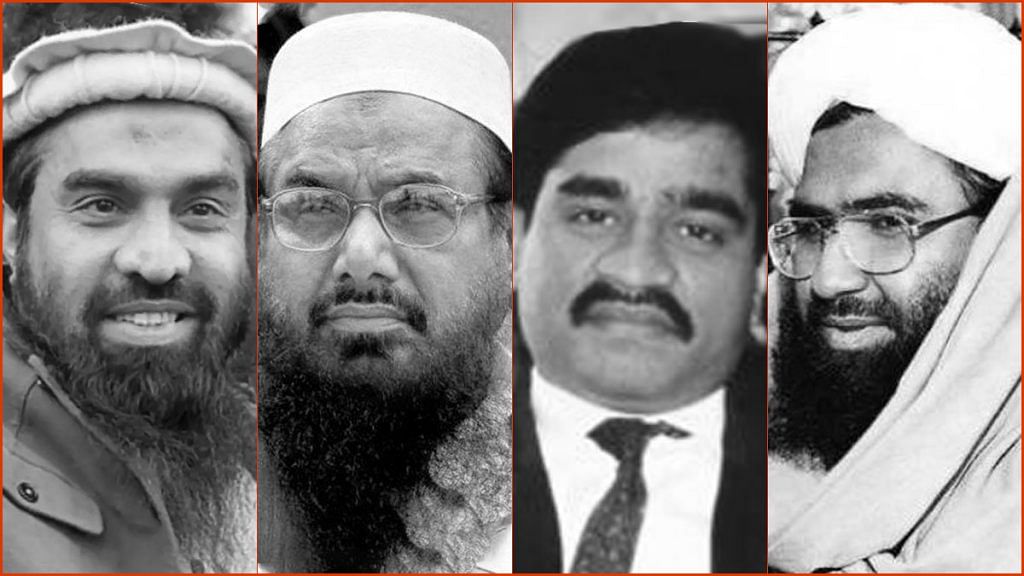New Delhi: For the first time, four individuals have been listed as ‘designated terrorists’ by the Government of India under the amended Unlawful Activities Prevention Act (UAPA).
The Narendra Modi government has attached the designation to Pulwama attack mastermind Masood Azhar, 26/11 Mumbai attacks mastermind Hafiz Saeed, underworld don Dawood Ibrahim and Lashkar-e-Taiba commander Zakir-ur-Rehman Lakhvi, according to an RTI reply by the Ministry of Home Affairs to a query filed by ThePrint.
Earlier, only terror outfits could be designated this way, not individuals. But the amended anti-terror Act, passed by Parliament in July 2019, introduced a provision to attach the label to individuals who commit or participate in acts of terrorism, prepare for them, or promote or encourage such acts.
Also read: Individuals & ‘urban Maoists’ terrorists under UAPA: Will it unleash new witch hunt?
Fears about the amendment
According to the amended UAPA, once a person is declared a ‘designated terrorist’, the onus of proving otherwise is on the individual.
So, although the first four names on the list are infamous cross-border terrorists, there is a fear that in future, individuals within India — insurgents, extremists and even those labelled ‘Urban Naxals’ — could be designated.
This fear was voiced by opposition parties in Parliament during the debate on the amendment — Nationalist Congress Party MP Supriya Sule, for example, said it could be misused to “unfairly target social activists”.
Union Home Minister Amit Shah had responded to these fears in the Lok Sabha, saying that the police was “not interested in nabbing social workers, but those who work to foster Urban Naxalism”.
“They need to be stopped… They misguide the poor and let them pick up arms against the state,” Shah had said.
Also read: Nothing wrong with Amit Shah’s new UAPA. Congress must decide if it wants India to be secure
‘A necessary move for India’
A home ministry official, speaking to ThePrint on the condition of anonymity, sought to allay these fears, saying designating individuals as terrorists is a practice followed across the world, including in the US, Europe, China, Israel, Pakistan and even Sri Lanka.
The official said it was a necessary move for India, as it would directly target persons spreading the idea of terrorism.
“When we designate organisations as terror outfits and ban them, they re-emerge and reconstitute under different names. The same individual reconstitutes a different organisation with a new name and carries on with his nefarious ideas, so it is a failed exercise. Designating an individual as a terrorist will directly hit him,” the official said, adding that it would be a “more effective way” of fighting terrorism.
The official said that the move will also help the government “brand the kingpins”.
“Once their names are in the list, they will be branded as ‘designated terrorists’, so they will be unable to move around in the world freely. It minimises the chances of them slipping,” the official said.
Also read: Blame Amit Shah for UAPA changes but Nehru, Indira ignored civil liberties too
Grey area
The home ministry official said an individual will be designated a terrorist only after the government has “sufficient proof”.
This could be a grey area, since “sufficient proof” has not been defined by the amended UAPA, and could be applied arbitrarily — especially because this label will be applied to an individual without any trial by the court.
However, a second official responded to this fear by saying: “It is not something that will be done arbitrarily. All security agencies will be involved, and the facts and evidence will be corroborated with multiple channels before a suggestion to designate an individual as a terrorist goes to the MHA.”
The second official said an individual who has been designated as a terrorist can always file a review. But this official did confirm that the burden of proof will lie on the individual.
“The individual can give a representation to the MHA. The officials concerned will then be given a period of 45 days to review it. If the representation is rejected, the individual can re-appeal within 30 days, and then an independent review committee will be constituted to look into the appeal,” the official said, adding that the independent committee comprises of a secretary-level official and two others — either sitting or retired high court judges.
The official also clarified that “the onus to prove to the committee” that the designated individual has actually been involved in terror-related activities “is entirely on the government”.
Also read: NIA arrests RTI activist Akhil Gogoi amid Assam unrest, charges him under amended UAPA
